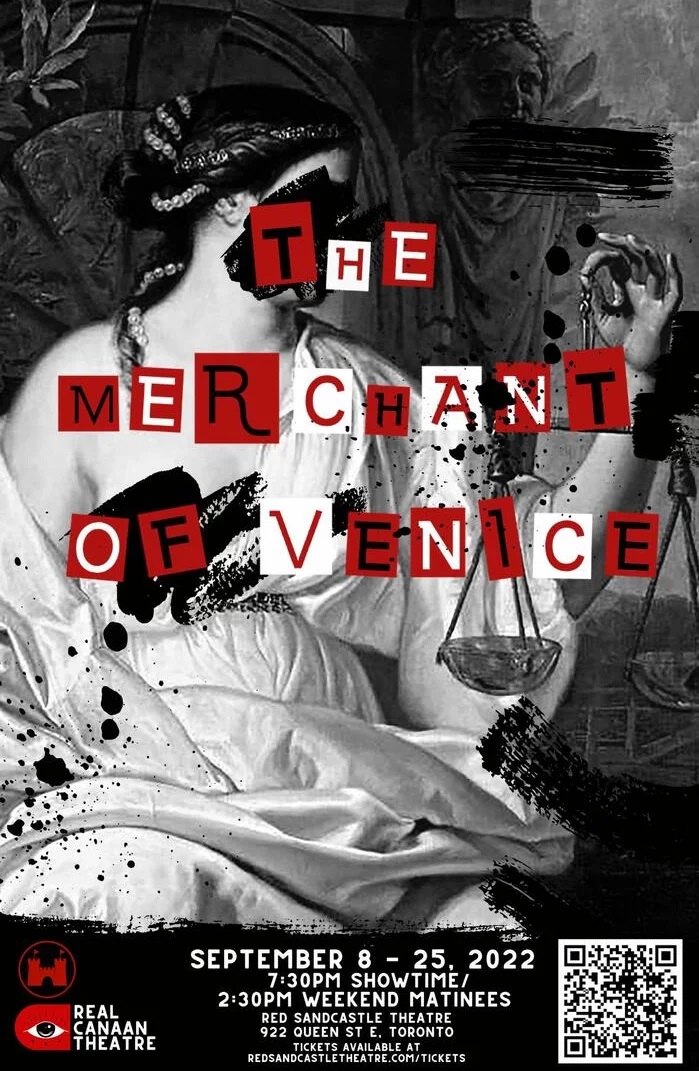Creativity loves constraint: Real Canaan Theatre mounts a sparse, brilliantly modern Merchant of Venice
 Last week brought a welcome introduction to Real Canaan Theatre, a new theatre company in Toronto that is presenting its inaugural production: Shakespeare’s The Merchant of Venice, directed by Christopher Lucas and designed and produced by Carrie Lucas.
Last week brought a welcome introduction to Real Canaan Theatre, a new theatre company in Toronto that is presenting its inaugural production: Shakespeare’s The Merchant of Venice, directed by Christopher Lucas and designed and produced by Carrie Lucas.
The duo co-founded the company with a commitment to create and produce “vibrant, accessible, ‘no-frills’ theatre, whose heart is found in the craft of performance and whose soul lies in the relationship between actor and audience… work that will provoke discussion and promote inclusion”. This debut production goes a long way towards achieving these aims.
Watching the play at the storefront Red Sandcastle Theatre on Queen Street East is an intimate experience. With just three rows of seats, the action unfolds mere feet away from the audience – an effect that is immediate and captivating. In this small space, an ensemble of energetic and talented young actors bring the play to vibrant life – and they do so by playing big. A magnetic Aaron MacPherson fills the space in smaller roles ranging from the Clown to Salanio to the Duke. Elyssia Giancola commands attention as a poised, yet multi-faceted Portia. Bridget Ori presents a laconic and inscrutable Antonio – with Hadley Abrams serving as a sincere and complementary Bassanio. Roberto Ercoli leans into a delightfully Italian-Canadian Gratiano, and Freya Scerri Diacono is winningly playful as Nerissa. And last but certainly not least, Kitti Laki, is a true force of nature in the role of Shylock.
There are no sets or costumes. The contemporary clothing the characters wear is black and white, a colour palette that underscores the themes of justice and mercy, right and wrong, and flexibility and rigidity that lie at the core of the play. The question of the day: can justice and mercy coexist? With a simple change of voice and a prop or two (a wig, a shirt, sometimes just shoes), the actors transform from one character to another. This minimalist strategy plays to the physical constraint of the stage: there is limited room for the actors to sit when they are not in a scene. It also helps tighten our focus on the dialogue, themes and relationships within the play.
The Director’s Note asks audiences to set aside preconceptions they might hold about the play’s themes. The production repositions the way the original text problematizes approaches to race, religion and ethnicity, and how these inform identity – and the Director’s note asks audiences to judge the implications and merits of this subversion. One way the production addresses this aim is through its diverse casting. The casting of nonbinary actor Adams as the impoverished Bassanio and female actor Ori as the merchant Antonio subverts the dynamic of male friendship – or is it more than friendship – that the text presents, and has been a source of critical debate.
A second major change transforms the heartless moneylender Shylock from a Jewish man into a woman whose origins are less culturally specific and profoundly topical (I won’t spoil the surprise). This stroke of genius is brilliantly realized by an intense Laki. Instead of a stereotypical usurer who is out for blood, her Shylock is a figure warped by her mistreatment by the dominant culture. Even insisting on her “pound of flesh” as rightful payment of Antonio’s debt does not make her a one-note villain.
We feel sympathy when she is brought low during the culminating courtroom scene . . . where that black-and-white colour palette comes sharply into focus. For no one in this play takes the high road. Despite copious talk of justice tempered with mercy, every single character attends to the letter, rather than the spirit of the law. Shylock is at the mercy of the people who have in many ways created her . . . and we feel her pain. And the famous monologue “I am a Jew. Hath not a Jew eyes? . . . ” (III:i) takes on new relevance, complexity and pathos, thanks to the substitution of her new origin (which never implies that she is not Jewish).
As Real Canaan Theatre’s production of The Merchant of Venice production ably demonstrates, creativity loves constraint. Don’t be nonplussed by the small space and no-frills staging: within them lie clever casting and staging, broad performances, and deep thought that will send you away turning this show over in your mind. The show runs until September 25 at The Red Sandcastle Theatre, which, by the way, is next door to Ed’s Ice Cream shop. Their homemade ice cream and gelato make for a terrific treat during intermission.
Reserve tickets to The Merchant of Venice on ticketscene.ca.
© Arpita Ghosal, SesayArts Magazine 2022
About The Author
Arpita Ghosal
Arpita Ghosal is a Toronto-based arts writer. She founded Sesaya in 2004 and SesayArts Magazine in 2012.
Visit About Us > Meet the Team to read Arpita’s full bio …




